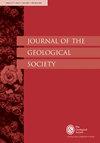Morphological evidence of the extension of the Zabargad Transform Fault Zone to the Saudi Arabian Red Sea margin
IF 3
3区 地球科学
Q2 GEOSCIENCES, MULTIDISCIPLINARY
引用次数: 0
Abstract
Fault locations and orientation of the Zabargad Transform Fault Zone, also called the Zabargad Fracture Zone (ZFZ) have, so far, only been delineated by satellite-based geophysical data, causing intense debate over the last decades. Newly recognized geomorphological features identified in bathymetry and lidar data from the NE Red Sea margin present the first ground evidence for the northern extent of the ZFZ. The features are aligned over 84 km starting from the Mabahiss Deep, near the spreading axis, and continue to the shallow Saudi Arabian shelf, along the northern termination of the Al Wajh carbonate platform. Analysis of the seafloor morphology revealed three geomorphic terrains: (1) a deep incised canyon feeding into the Mabahiss Deep, which is characterized by dozens of amphitheatre-shaped scarps, (2) a 22 km-wide head-scarp that follows the Al Wajh platform edge, (3) and multiple fault scars and graben-like structures on the shallow shelf. We interpret these morphological features as deformation indicators in association with the deformation processes in the ZFZ, and postulate that they represent the northern end of the ZFZ. In addition, the fault zone delineates the northwest margin of the Al Wajh carbonate platform, and most likely continues to shape it. This paper gives new insights in the interaction between fracture zones and continental margins and their role in the seafloor morphogenesis.Zabargad转换断层带向沙特阿拉伯-红海边缘延伸的形态学证据
到目前为止,Zabargad转换断层带(也称为Zabargad断裂带(ZFZ))的断层位置和方向仅由基于卫星的地球物理数据划定,在过去几十年中引起了激烈的争论。在红海东北部边缘的测深和激光雷达数据中发现的最新地貌特征为ZFZ北部范围提供了第一个地面证据。这些特征从扩展轴附近的Mabahiss Deep开始排列超过84公里,并沿着Al-Wajh碳酸盐岩平台的北端一直延伸到沙特阿拉伯浅陆架。对海底形态的分析揭示了三种地貌地形:(1)一个深入Mabahiss深部的深切峡谷,其特征是数十个圆形陡崖;(2)一个22公里宽的头部陡崖,沿着Al Wajh平台边缘;(3)浅陆架上有多个断层痕和地堑状结构。我们将这些形态特征解释为与ZFZ中的变形过程相关的变形指标,并假设它们代表ZFZ的北端。此外,断裂带描绘了Al-Wajh碳酸盐岩平台的西北边缘,并很可能继续塑造它。本文对断裂带与大陆边缘之间的相互作用及其在海底形态发生中的作用提供了新的见解。
本文章由计算机程序翻译,如有差异,请以英文原文为准。
求助全文
约1分钟内获得全文
求助全文
来源期刊

Journal of the Geological Society
地学-地球科学综合
CiteScore
6.00
自引率
3.70%
发文量
68
审稿时长
6-12 weeks
期刊介绍:
Journal of the Geological Society (JGS) is owned and published by the Geological Society of London.
JGS publishes topical, high-quality recent research across the full range of Earth Sciences. Papers are interdisciplinary in nature and emphasize the development of an understanding of fundamental geological processes. Broad interest articles that refer to regional studies, but which extend beyond their geographical context are also welcomed.
Each year JGS presents the ‘JGS Early Career Award'' for papers published in the journal, which rewards the writing of well-written, exciting papers from early career geologists.
The journal publishes research and invited review articles, discussion papers and thematic sets.
 求助内容:
求助内容: 应助结果提醒方式:
应助结果提醒方式:


